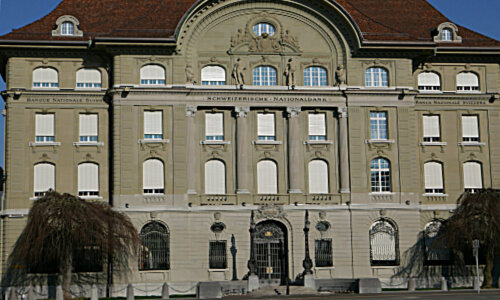The good times are over for now – the Swiss National Bank has probably lost billions of francs in the first quarter as the economy went into meltdown. That leaves a smaller cake to share for the federal and cantonal governments.
Minus 30 billion Swiss francs ($31 billion) – this is how much the Swiss National Bank (picture of its headquarters in Bern below) has lost in the first quarter of 2020. That's at least according to Alessandro Bee at the chief investment office of UBS, the country's largest bank.
The global stock market declined by an average 22 percent in the first quarter, leading to a minus of 35 billion francs in the equity portfolio of the Swiss central bank. The portfolio was worth some 160 billion francs at the end of 2019, UBS said in its report sent on Tuesday. The bank is usually accurate in its predictions about the size of SNB's profits or losses.

Value of Gold Rises
The drop in value of equities was further aggravated by the appreciation of the franc. Compared with the euro, the currency of Switzerland's biggest trading partners, the franc added some 3 percent since the beginning of the year. Against pound sterling the franc is up about 6 percent, a consequence of the cut in interest rates by the Bank of England, which made the Swiss currency more attractive for investors.
The rise in the price of gold, lower interest (and therefore higher bond prices) and revenue from negative interest on banks' cash deposits partially offset the drop in the value of equities and the appreciation of the franc, the UBS economists said.
The price of a kilogram of gold increased almost 12 percent since the start of the year. It is currently trading at about 52,800 francs. The SNB holds about 1,040 tons of gold in its reserves.
Fighting Over the Spoils
The drop by about 30 billion francs means that the SNB's total equity fell to about 137 billion francs. The distribution reserve, out of which the bank makes its annual payments to the government, will have declined as well.
So far, the central and regional government need not worry about a drop in contributions, UBS said. The reserve amounted to 84 billion francs after the last payments. The SNB only reduces the payments once the reserves drop below the threshold of 20 billion francs. But even in that case the SNB would likely face calls for higher payments to the public purse, UBS noted.
Volatile Markets for Some Time to Come
The development of the economy and stock markets will affect the SNB in coming quarters too. Since the end of the first quarter, global stock markets jumped about 8 percent, recovering some of the lost ground. Once investors realize how badly hit the global economy has been by the measures to contain the virus, stocks may well drop again.

































